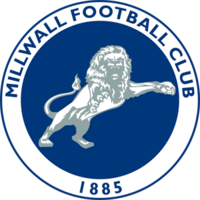Millwall Lionesses L.F.C.
 | |||
| Full name | Millwall Lionesses Football Club | ||
|---|---|---|---|
| Nickname(s) | The Lionesses | ||
| Founded | 1973 | ||
| Ground | St Paul's Sports Ground, Rotherhithe | ||
| Chairman | Sean Daly | ||
| Manager | Jack Wheeler | ||
| League | London and South East Women's Regional Football League | ||
| 2021–22 | London and South East Women's Regional Football League, 6th of 11 | ||
|
| |||
Millwall Lionesses Football Club is an English women's football club based in Rotherhithe, south-east London, that plays in the London and South East Women's Regional Football League, the fifth tier of English women's football.[1]
Founded in 1973, the group of women who made up the Lionesses were at first snubbed by Millwall FC but went on to become the first women's football team to affiliate to a professional men's team, Millwall F.C. who are nicknamed "The Lions". The Lionesses pioneered the now common "Football in the Community Scheme".
History
[edit]Millwall Lionesses remained an independent club in their initial years of existence. In the mid–1980s Millwall FC, who were trying to mitigate an appalling reputation for football hooliganism and racism, embraced the female club as part of their community project.[2] Development officer Gary Stempel sourced funding from the Greater London Council (GLC) and then a combination of Lewisham and Greenwich Councils, as well as the Sports Council.
Millwall Lionesses became a leading force in both the women's game and the "Millwall Community Programme", and played an active part in the development of girls' football. Millwall Lionesses were the first club to have a female Centre of Excellence, of which there eventually became 42 in England. Millwall Lionesses field teams with an age range of eight, to thirty plus.[3]
The former England women's national football team coach Hope Powell began her career with The Lionesses at the age of eleven, making her international debut at the age of 16.
The Lionesses won the FA Women's Cup in 1991 and 1997.[4]
The Lionesses won promotion back to the FA Women's Premier League National Division in 2008–09, following an eight-year absence since their relegation in 2001.[5]
In 2014 the Lionesses were founding members of the FA Women's Super League 2, the new 2nd tier of Women's football in England later renamed the FA Women's Championship.[6]
In April 2018, the team announced the possibility of going into administration due to financial discrepancies and a lack of sponsorship.[7]
In May 2019, shortly after the conclusion of the 2018–19 FA Women's Championship, it was announced that the Lionesses would split from Millwall F.C. forming a breakaway club named London City Lionesses.[8] The FA Women's Championship licence was transferred to the new club.[9] Millwall Lionesses would be operated through the Millwall Community Trust, whilst playing their football in the Eastern Region Women's League.[1][8] Colin Reid was appointed as manager, with St Paul's Sports Ground in Rotherhithe confirmed as their home venue.[1]
Players
[edit]- As of 29 June 2019.[10]

| No. | Position | Player | Nation |
|---|---|---|---|
| 13 | GK | Chloe Sansom | |
| 3 | DF | Leanne Cowan | |
| 12 | DF | Beth Powell | |
| — | DF | Jasmine Augustus | |
| 16 | MF | Ellie Stenning | |
| 21 | DF | Kalani Peart | |
| — | FW | Beth Lumsden | |
| 19 | FW | Beth Harford | |
| 1 | GK | Grace Taylor | |
| 4 | MF | Freya Bailes | |
| 18 | MF | Michelle Young | |
| 25 | MF | Sara Guzowska | |
| 28 | MF | Francesca Ali | |
| 22 | MF | Chloe Wilkinson |
References
[edit]- ^ a b c Millwall Lionesses (6 August 2019). "Millwall Lionesses announce Colin Reid as new manager". Millwall FC. Archived from the original on 29 April 2023. Retrieved 18 August 2019.
- ^ Davies, John (22 September 2007). "Football gets a kick start". Times Educational Supplement. Archived from the original on 26 September 2013. Retrieved 19 May 2012.
"The mid-80s was a violent era, and the club was desperate to get away from its (fans') racist image and really take the club back to the local community," recalls Hicks.
- ^ "Millwall Lionesses History and Honours". Archived from the original on 28 September 2007. Retrieved 7 August 2007.
- ^ Mike Rowbottom (5 May 1997). "Football: Lionesses bring pride to Millwall". The Independent. Archived from the original on 14 May 2022. Retrieved 12 April 2011.
- ^ Tony Leighton (13 April 2009). "Millwall Lionesses set for Premier League return". The Guardian. Archived from the original on 28 September 2013. Retrieved 2 January 2012.
- ^ FA WSL (5 September 2018). "CLUB TIMELINE". FA WSL. Archived from the original on 8 April 2019. Retrieved 5 September 2018.
- ^ Miller, Nick (18 April 2018). "Football cannot afford for the unbeatable Millwall Lionesses to lose their battle off the pitch". Football.london. Archived from the original on 27 April 2023. Retrieved 27 April 2023.
- ^ a b Millwall FC (15 May 2019). "Club Statement: Millwall Lionesses". Millwall FC. Archived from the original on 29 April 2023. Retrieved 13 May 2019.
- ^ "London City Lionesses: FA Women's Football board approve Millwall switch". BBC News. 14 May 2019. Archived from the original on 15 April 2023. Retrieved 14 May 2019.
- ^ "Millwall Lionesses Player Squad". TheFA WSL. Archived from the original on 7 April 2019.
External links
[edit]- Lionesses' page at Millwall FC (archived)
